2018 Scotiabank Giller Prize Winner
Esi Edugyan
Washington Black
2018 Shortlist
The 2018 Scotiabank Giller Prize jury announced its shortlist on Monday, October 1, 2018. The five titles were chosen from a longlist of 12 books announced in St. John’s, NL on September 17, 2018.
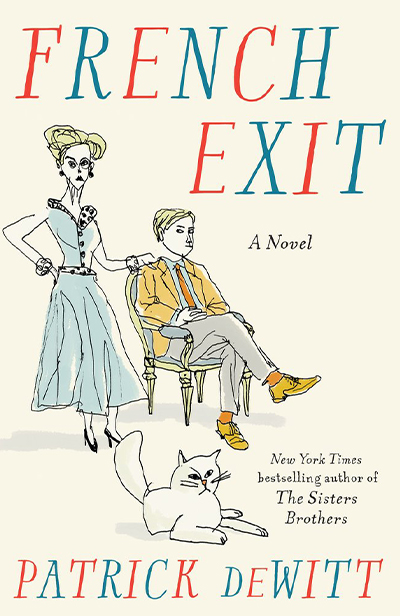
French Exit by Patrick deWitt
Biography
Patrick DeWitt was born on Vancouver Island in 1975. He is the author of three critically acclaimed novels: Undermajordomo Minor, Ablutions, and The Sisters Brothers, which won the Governor General’s Literary Award for Fiction, the Rogers Writers’ Trust Fiction Prize, and the Stephen Leacock Medal, and was shortlisted for the Man Booker Prize and the Scotiabank Giller Prize. He lives in Portland, Oregon.
Jury Citation
A “tragedy of manners” about people out of sync in the world, this novel is disconcertingly funny. It strikes postures where a more conventional writer would have been sincere and humourless. Its subjects are effrontery, wealth, death and bad manners. Many of the greatest novels are about nothing so very important, and they last because they are done beautifully. French Exit shows Patrick deWitt’s literary mastery and perfect ear. It’s an immaculate performance on ice, executed with sharp shining blades, lutzing and pirouetting above unknowable black depths.

Songs for the Cold of Heart by Eric Dupont, translated by Peter McCambridge
Biography
Born in 1970, Eric Dupont lives and works in Montreal. He has published 4 novels with Marchand de feuilles and in France with Éditions du Toucan and Éditions J’ai lu (Flammarion). He is a past winner of Radio-Canada’s “Combat des livres” (the equivalent of the CBC’s Canada Reads contest), a finalist for the Prix littéraire France-Québec and the Prix des cinq continents, and a winner of the Prix des libraires and the Prix littéraire des collégiens. His fourth novel, Songs for the Cold of Heart (La fiancée américaine) translated by Peter McCambridge, has sold over 60,000 copies in Quebec alone.
Jury Citation
Once upon a time in Quebec there was a girl named Madeleine. A tiny red headed waif with only a suitcase in her possession steps off a train in a frozen village, and a strapping Quebec man falls head over heels in love with her strangeness. A baby is born from this union that is so big, it manages to kill both its parents in childbirth. As magnificent a work of irony and magic as the boldest works of Gabriel Garcí¬a Márquez, but with a wholly original sensibility that captures the marvellous obsessions of the Quebecois zeitgeist of the twentieth century. It is without any doubt, a tour de force. And the translation is as exquisite as a snowflake.
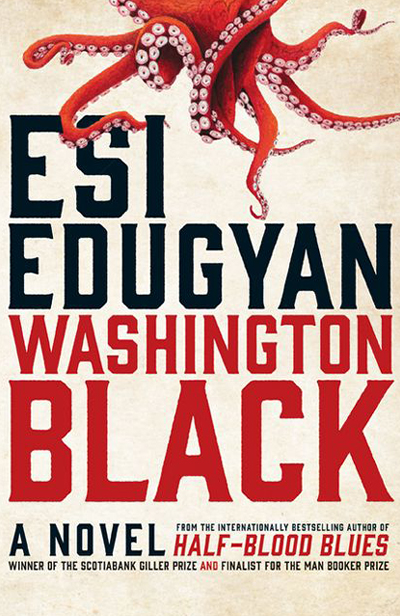
Washington Black by Esi Edugyan
Biography
Esi Edugyan won the Scotiabank Giller Prize in 2011 for her novel Half-Blood Blues. The novel was a finalist for the Man Booker Prize, the Governor General’s Literary Award for Fiction, the Rogers Writers’ Trust Fiction Prize and the Orange Prize for Fiction. The author lives in Victoria, BC.
Jury Citation
How often history asks us to underestimate those trapped there. This remarkable novel imagines what happens when a black man escapes history’s inevitable clasp – in his case, in a hot air balloon no less. Washington Black, the hero of Esi Edugyan’s novel is born in the 1800s in Barbados with a quick mind, a curious eye, and a yearning for adventure. In conjuring Black’s vivid and complex world – as cruel empires begin to crumble and the frontiers of science open like astounding vistas – Edugyan has written a supremely engrossing novel about friendship and love and the way identity is sometimes a far more vital act of imagination than the age in which one lives.
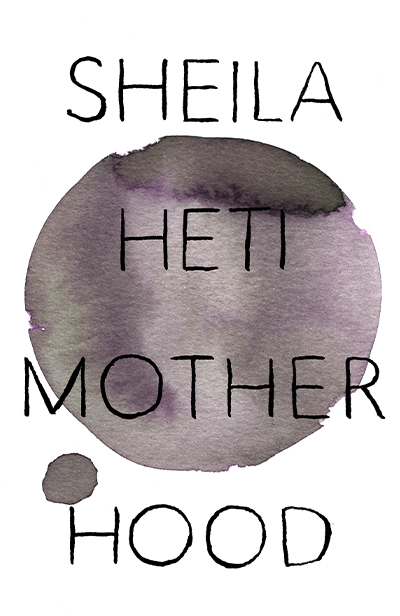
Motherhood by Sheila Heti
Biography
Sheila Heti is the author of seven books, including the novel How Should a Person Be? which was named a New York Times Notable Book; the story collection The Middle Stories; and the novel Ticknor. Her books have been translated into twelve languages, and her writing has been featured in various publications, including the New York Times, London Review of Books, the New Yorker, n+ 1, McSweeney’s, Harper’s and the Believer. She lives in Toronto.
Jury Citation
A personal story, a feminist debate, a philosophical reflection on time, genealogy and Art – these are just some of the narrative strands that Sheila Heti weaves into Motherhood, a complex and defiant exploration of contemporary womanhood. As her narrator interrogates the spaces between motherhood and childlessness, other paths, other choices, emerge, including the possibilities of fiction itself. In her playful but precise prose, Heti turns interiority into an expansive landscape with life-altering implications for her narrator and anyone with an interest in the paradoxes of choice and the randomness of free will.

An Ocean of Minutes by Thea Lim
Biography
Thea Lim’s writing has been published by the Southampton Review, the Guardian, Salon, the Millions, Bitch magazine, Utne Reader, and others, and she has received multiple awards and fellowships for her work. She holds an MFA from the University of Houston and she previously served as nonfiction editor at Gulf Coast. She grew up in Singapore and lives in Toronto.
Jury Citation
America is in the midst of a deadly flu pandemic. In order to afford medical treatment for her husband, a young woman agrees to travel through time. They agree to meet in the future. What is five minutes for her is twelve years for him. And, in the briefest of moments, they have become irreconcilable strangers. In an Ocean of Minutes, debut novelist, Thea Lim asks the reader to confront contemporary issues – social class, immigration, citizenship, corporate power, poverty, and the all too familiar, love and loss. The novel is beautifully written and guides us through a plot that moves backwards and forward – yet, never lets us go.
2018 Longlist
The 2018 Scotiabank Giller Prize jury announced its longlist on Monday, September 16, 2018.

Zolitude by Paige Cooper
Simona will not come, so I go alone up the icy steps to the wine bar to find Lars sitting in tableau, dressed like a banker or a dean in a gold Windsor knot and blue shirt, white at cuff and collar, drinking a cappuccino with one knuckle through the cup’s ring hole. These days our free hours are spent in blackout. Daylight shows up to eat its lunch over our desks, then leaves. Otherwise, we and time are left to manage ourselves. If this were the morning dark Lars would have a newspaper, but it’s evening and his work is laid aside; here ’s a man who sits and reviews the day’s developments with clarity and logic. When Simona first introduced me to Lars, I thought: here is a man I would try to please if I worked under him. If he were my physician, I might lie about my habits.
I linger in the entryway, hang my overcoat beside his, unwind and rewind my scarf, fish my phone out of my purse and face it blankly. The room is bright and vacant. Two women confess to each other in Russian in the corner. The attendant behind the pine counter looks familiar but greets me formally—he is my age, probably we attended a school together at one point or another—and I wish he would retreat somewhere while I do this instead of standing there in his black shirt imagining Lars and me into a gummy internet affair coalesced, or some other private obscenity, when actually I am not even the person in this, I am just the one who is here.
“Simona is late?” Lars can’t help himself; he looks out to the sleety sidewalk.
“No,” I say. “She won’t come.”
He totters his cup in its saucer. One red blemish has developed high on his forehead. His skin’s withered. Of course he isn’t sleeping. How could he not have anticipated this from Simona, whose standard of callousness or cowardice expresses itself hourly? But of course he hoped she would overcome herself to be here. Simona, who is currently curled in the sunless suite of her parents’ house in the Silent District, telling everyone she ’s terrified.
I blind-order a burgundy from the server—Dzintars is the name I now remember; a painter, visible with the artists’ union—as he comes to stand by. I am hungry but I’ll eat at home as it’s doubtful Lars will want to pay like he usually does when we’re three, though he ’s not a banker or a dean but a preacher, or actually an artist, and very broke. Simona is at her family’s home, and I’m here with her ring in my change purse. Lars’ cappuccino is a pillow of foam at the bottom of his cup.
“So,” Lars sighs. “In that case.”
There’s only one concept of ending that’s of relevance here, in the Wednesday afterdark, just minutes or years after I approved him—so flattering how she insisted I convene my own tribunal, how she implied I had some expertise—so she could abandon me.
“She says she ’s afraid.”
Sympathy softens him. He has misunderstood.
Yesterday Simona issued summons, giving her parents’ address instead of the tiny, tall apartment over Lac˘ple-ša she shared with Lars. She answered the door in leather slippers and bare legs, her face puffed and greasy. We sat together on her loveseat. She said, “I woke up in the dark but I couldn’t move. For five minutes, not my arms or legs. I was a corpse. I didn’t know where he was. He wasn’t beside me. I listened for him. I listened, but I couldn’t move and I was so afraid as I listened that I would hear him coming.”
Then she laid out for me her various proofs: a documentary Lars liked about a man who ate a prostitute; the dream she had last year where he drilled holes up her arms, gore ellipses from wrists to elbows; a picture he sent her of a dead doe he found while visiting his mother in the Swedish countryside. She left Lars that night, and now he sits across from me, looking like an American man of business, honest and canny, though with an unusual tolerance for feelings and their ambiguity.
—
Excerpted from ZOLITUDE. Copyright © 2018 by Paige Cooper. Excerpted by permission of A John Metcalf Book, an imprint of Biblioasis. All rights reserved. No part of this excerpt may be reproduced or reprinted without permission in writing from the publisher.

French Exit by Patrick deWitt
She was a moneyed, striking woman of sixty- five years, easing her hands into black calfskin gloves on the steps of a brownstone in New York City’s Upper East Side. Her son, Malcolm, thirty- two, stood nearby looking his usual broody and unkempt self. It was late autumn, dusk; the windows of the brownstone were lit, a piano sounded on the air— a tasteful party was occurring. Frances was explaining her early departure to a similarly wealthy though less lovely individual, this the hostess. Her name doesn’t matter. She was aggrieved.
“You’re certain you have to go? Is it really so bad as that?”
“According to the veterinarian it’s only a matter of time,” Frances said. “What a shame. We were having such a lovely evening.”
“Were you really?” the hostess asked hopefully.
“Such a lovely evening. And I do hate to leave. But it sounds an actual emergency, and what can be done in the face of that?”
The hostess considered her answer. “Nothing,” she said finally. A silence arrived; to Frances’s horror, the hostess lunged and clung to her. “I’ve always admired you so,” she whispered.
“Malcolm,” said Frances.
“Actually I’m sort of afraid of you. Is that very silly of me?”
“Malcolm, Malcolm.”
Malcolm found the hostess pliable; he peeled her away from his mother, then took the woman’s hand in his and shook it. She watched her hand going up and down with an expression of puzzlement. She’d had two too many drinks and there was nothing in her stomach but a viscous pâté. She returned to her home and Malcolm led Frances away, down the steps to the sidewalk. They passed the waiting town car and sat on a bench twenty yards back from the brownstone, for there was no emergency, no veterinarian, and the cat, that antique oddity called Small Frank, was not unwell, so far as they knew.
Frances lit a cigarette with her gold lighter. She liked this lighter best due to its satisfying weight, and the distinguished click! it made at the moment of ignition. She aimed the glowing cherry at the hostess, now visible in an upstairs window, speaking with one of her guests. Frances shook her head. “Born to bore.”
Malcolm was inspecting a framed photograph he’d stolen from the hostess’s bedroom. “She’s just drunk. Hopefully she won’t remember in the morning.”
—
Excerpted from FRENCH EXIT. Copyright © 2018 by Patrick DeWitt. Excerpted by permission of House of Anansi Press. All rights reserved. No part of this excerpt may be reproduced or reprinted without permission in writing from the publisher.

Songs for the Cold of Heart by Eric Dupont, translated by Peter McCambridge
Years before her mother bundled her onto a coach bound for New York City in a December blizzard, Madeleine Lamontagne had been a little girl who loved Easter bunnies, Christmas trees, and the stories told by her dad, Louis Lamontagne. Nothing out of the ordinary there. After all, everyone loved to hear Louis “The Horse” Lamontagne’s tall tales. Before television, his stories were the best way to pass the time in Rivi.re-du-Loup.
As any drinking man in Rivi.re-du-Loup will tell you, it was TV that killed the Horse, not the combustion engine. They’ll also tell you—and there’s no reason to doubt them—that any man’s story, wherever he may be, never finds a more attentive ear than his daughter’s, especially if she is the oldest and as such occupies a special place of her own in her father’s heart. All of which is to say that Louis “The Horse” Lamontagne, or Papa Louis as the children of Rivi.re-du-Loup liked to call him, never had a more attentive audience than his little Madeleine, sitting right there on the sofa in her father’s funeral home on Rue Saint-Fran.ois-Xavier, in the parish of the same name, in the town of Rivi.re-du-Loup in the province of Quebec.
Amid the 1950s furniture stood a ghastly ashtray mounted on an honestto- goodness moose leg. A cousin had made it after carving up the carcass of the animal that Papa Louis had killed in the fall of 1953, when Madeleine was just three years old. She was now eight. Papa Louis was sitting in his armchair, and her two brothers on the bottle-green sofa. In her left hand, she held a full glass of gin that Papa Louis was eyeing thirstily.
“Get a move on, Mado! We wanna hear the story!” It was Madeleine Lamontagne’s oldest brother Marc, age seven, who had just told his sister to hurry up and get Papa Louis a drink so the story could at last begin. The other brother, Luc, watched a dust mote drift through the air.
“Cut it out!” Madeleine retorted before sitting down to his right.
Marc slid his hand in under her thigh. She twisted his finger back, just enough to get her point across, not quite enough to dislocate it. Madeleine grinned. The gin was having its effect. There would be a story. To her left, Marc slipped his hand back under her thigh, and this time she let him. “His fingers must be cold,” Madeleine reasoned, thinking that if she picked a fight with her brother, Papa Louis might suddenly decide to send them all off to bed. Fortunately, Marc turned his attentions away from her andwatched Papa Louis knock back his gin. To Marc’s left, little Luc, his darkhaired head leaning against his big brother’s frail shoulder. He was going to fall asleep from one moment to the next. Luc, age five, had come into the world the day of the Coronation of Queen Elizabeth II: June 2, 1953. The sofa was almost full, but there would have been room for the cat if their mother Irene had allowed it.
—
Excerpted from SONGS FOR THE COLD OF HEART. Copyright © 2018 by Eric Dupont. English translation by Peter McCambridge. Excerpted by permission of QC Fiction, an imprint of Baraka Books. All rights reserved. No part of this excerpt may be reproduced or reprinted without permission in writing from the publisher.

Washington Black by Esi Edugyan
No one grieved him; in the fields we hung our heads, keening, grieving for ourselves and the estate sale that must follow. He died very old. I saw him only at a distance: stooped, thin, asleep in a shaded chair on the lawn, a blanket at his lap. I think now he was like a specimen preserved in a bottle. He had outlived a mad king, outlived the slave trade itself, had seen the fall of the French Empire and the rise of the British and the dawn of the industrial age, and his usefulness, surely, had passed. On that last evening I remember crouching on my bare heels in the stony dirt of Faith Plantation and pressing a palm flat against Big Kit’s calf, feeling the heat of her skin baking up out of it, the strength and power of her, while the red sunlight settled in the cane all around us. Together, silent, we watched as the overseers shouldered the coffin down from the Great House. They slid it rasping into the straw of the wagon and, dropping the rail into place with a bang, rode rattling away.
That was how it began: me and Big Kit, watching the dead go free.
His nephew arrived one morning eighteen weeks later at the head of a trail of dust-covered carriages driven directly from the harbour at Bridge Town. That the estate had not been sold of was, wethought at the time, a mercy. The carriages creaked their slow way up the soft embankment, shaded by palm trees. On a flatbed wagon at the rear of the caravan sat a strange object, draped in canvas, as large as the whipping boulder in the small field. I could not imagine its purpose. All this I remember well, for I was again with Big Kit at the edge of the cane—I rarely left her side in those days—and I saw Gaius and Immanuel stiffly open the carriage door and extend the step. I could see, at the Great House, pretty Émilie, who was my age, and whom I would glimpse some evenings dumping the pans of wash water into the long grass outside the scullery. She descended the first two steps of the verandah and, smoothing out her apron, fell still.
The first man to emerge, carrying his hat in his hands, had black hair and a long, horselike jaw, his eyes darkened by heavy brows. He raised his face as he descended and peered around at the estate and the men and women gathered there. Then I saw him stride back to the curious object and walk around it, inspecting the ropes and canvas. Cradling a hand to his eyes, he turned, and for a frightening moment I felt his gaze on me. He was chewing some soft-textured thing, his jaw working a little. He did not look away.
—
Excerpted from WASHINGTON BLACK by Esi Edugyan. Copyright (c) 2018 by Ides of March, Inc. All rights reserved. Excerpted by permission of Patrick Crean Editions, an imprint of HarperCollins Publishers Ltd. No part of this excerpt may be used or reproduced in any manner without the prior written permission of the publisher, except in the case of brief quotations embodied in reviews.
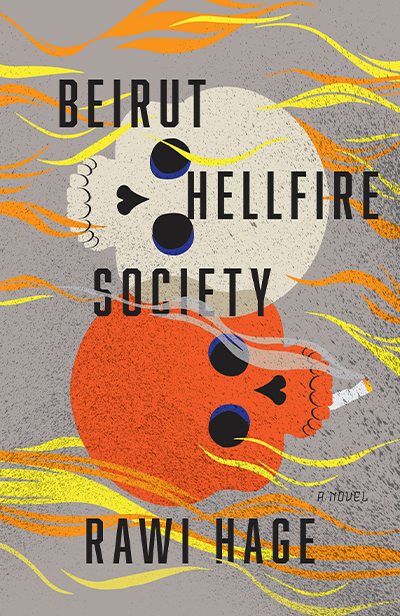
Beirut Hellfire Society by Rawi Hage
Now, the man told his son, you’re sixteen—old enough to become a member of the Society. The Hellfire Society, the father added. He switched on the car radio, and drove towards the coast and then up into the mountains of Lebanon.
They arrived at a secluded area in the high summit, and finally at a small stone house that looked to be abandoned. But the father picked up a key from under a potted plant, opened the door, and together he and his son entered. The house was simple and humble, cold and damp. Neglect and dust could be seen everywhere. The floor was bare, and through the soles of their shoes father and son felt the touch of leather against grains of dirt and sand. Walking across the room was slippery but manageable—two pairs of feet grinding little particles into the floor. The walls of the house were peeling, expos¬ing straw mixed with clay, an ancient technique for efficient insulation that the villagers had used for centuries. There was a bed in the corner of the main room and, in the middle, a stove with a chimney that extended its charcoal tube towards the ceiling before the cylinder shifted at the end, a perfect ninety degrees, to reach the top of the adjacent wall and cough out its smoke.
Welcome to the Society’s mansion, the father said. Pavolv followed his father into the second room. This was a later in addition to the house, separate from the main area. Its cement floor was bare and unpolished and the room’s main feature was a large metal door in the centre of the back wall, well a smaller door beneath the large one. Beside the doors, two large gas tanks were linked by tubes. To Pavlov’s eye, they resembled the garden, hoses often seen training like serpents around villagers’ houses.
Eventually we may have to change the pipes, his father said. It’s a simple procedure. You make sure to cut off the gas from its source there—he pointed at a handle embedded in the wall—and before you proceed, lock it firm. Look here, son. You twist this knob on the top in a counter-clockwise motion. Are you cold, son?
Pavlov nodded.
In no time this house will burn like hell, his father replied, and smiled. But let’s eat first, and then we’ll bring our unknown soul into the abode of fire, light and eternal warmth.
They washed their hands with cracked bars of soap under cold water, then roasted chestnuts, heated bread, set out thyme and olive oil and cheese that the father removed from a jar, and drank alcohol. When they were done, they brought the body inside, laid it on a wooden stretcher that the father had made himself and carried the cadaver to the second room. The father opened the metal door and Pavlov saw what looked like a deep, long oven.
The father turned to the cadaver, and with a singing, wailing voice he uttered these words: They say ashes to ashes, but we say fire begets fire. May your fire join the grand lumi¬nosity of the ultimate fire, may your anonymity add to the greatness of the hidden, the truthful and the unknown. You, the father continued, were trapped, lost, ignored, dejected, but now you are found, and we release you back into your origi¬nal abode. Happy are those rejected by the burial lots of the ignorant. The earth is winter and summer, spring and fall . . . We heard your call and we came.
Father and son lifted the bed off the stretcher and slid the cadaver into the stove. The father twisted the knobs of the gas tanks—bonbons he called them—struck a match and lit a fire inside. Then he asked his son to close the furnace door.
In time, the house became warm. It stood alone in its surroundings, a ball of heat against the chill of the mountains. Pavlov, bewildered by the rituals, sat in silence and listened as his father talked and drank and sang incomprehensible songs that had the rhythms of hymns. Then his father, drunk and tired, stumbled into bed and fell asleep.
—
Excerpted from BEIRUT HELLFIRE SOCIETY. Copyright © 2018 Rawi Hage. Excerpted by permission of Alfred A. Knopf Canada, a division of Penguin Random Canada Limited. All rights reserved. No part of this excerpt may be reproduced or reprinted without permission in writing from the publisher.

Motherhood by Sheila Heti
All through my childhood, I felt I had done something wrong. I searched my every gesture, my words, the way I sat upon a chair. What was I doing to make her cry? A child thinks she is the cause of even the stars in the sky, so of course my mother’s crying was all about me. Why had I been born to cause her pain? Since I had caused it, I wanted to take it away. But I was too little. I didn’t even know how to spell my own name. Knowing so little, how could I have understood a single thing about her suffering? I still don’t understand. No child, through her own will, can pull a mother out of her suffering, and as an adult, I have been very busy. I have been busy writing. My mother often says, You are free. Perhaps I am. I can do what I like. So I will stop her from crying. Once I am finished writing this book, neither one of us will ever cry again. This will be a book to prevent future tears—to prevent me and my mother from crying. It can be called a success if, after reading it, my mother stops crying for good. I know it’s not the job of a child to stop her mother from crying, but I’m not a child anymore. I’m a writer. The change I have undergone, from child to writer, gives me powers—I mean that magical powers are not far from my hand. If I am a good enough writer, perhaps I can stop her from crying. Perhaps I can figure out why she is crying, and why I cry, too, and I can heal us both with my words.
~
Is attention soul? If I pay attention to my mother’s sorrow, does that give it soul? If I pay attention to her unhappiness—if I put it into words, transform it, and make it into something new— can I be like the alchemists, turning lead into gold? If I sell this book, I will get back gold in return. That’s a kind of alchemy. The philosophers wanted to turn dark matter into gold, and I want to turn my mother’s sadness into gold. When the gold comes in, I will go to my mother’s doorstep, and I will hand it to her and say: Here is your sadness, turned into gold.
—
Excerpted from MOTHERHOOD. Copyright © 2018 Sheila Heti. Excerpted by permission of Alfred A. Knopf Canada, a division of Penguin Random Canada Limited. All rights reserved. No part of this excerpt may be reproduced or reprinted without permission in writing from the publisher.

Our Homesick Songs by Emma Hooper
Yes, said Cora. She pulled an old towel up over her, a blanket.
Out on the dark green night water, said Finn, there was a mer¬maid. And, because mermaids need to, it sang. Sad songs, homesick songs. Night after night, over a hundred thousand fish. And the only one who could hear it was a girl.
Lonely, said Cora.
Yes, a lonely girl, said Finn. Orphaned. But tying knots and listening to the mermaid sing made her feel a bit better. All through the night, she’d lie awake and knot and listen to the songs.
And then the storm, said Cora.
Yes, the storm, said Finn. There was a storm one night. And the girl couldn’t think of anything but her parents not being there, and the knots weren’t helping as much as they should, and the mermaid was singing and singing, not high and pretty, like you might think, but low and long, like she felt, so the girl got up, out of bed, and followed the song down to the water.
The sea.
Yes, to the sea. Where the storm was wild and it was probably too dangerous –
Definitely –
And it was definitely too dangerous, but she kept going any¬way, the mermaid’s singing washing up to her, calling out to her. She walked all the way to the edge of the sea and then, even though it was freezing cold, she took another step into the water. She should have sunk down, but she didn’t. She stayed on the surface.
She what?
She stayed on the surface.
She did? I don’t remember this part…
She did. Because the sea was so thick with cod, brought out by the singing, hundreds of thousands of them, she could walk on them, right across their backs, out and out and out towards the song…
Oh…
And it got louder and louder until it was louder than the wind, until –
Until she saw it wasn’t a mermaid at all, said Cora.
Yes, said Finn. Until she saw it wasn’t a mermaid. It was Dad. It was our dad. Singing.
Cora and Finn were on the ferry, going west. The sun had set and their parents were asleep, leaning against each other, surrounded by bags and boxes. There was no one else there. It was too foggy to see out the windows, to check for boat lights or anything else. Too quiet and late for music, too much pull of the sea for reading. There was nothing to do but tell stories. Tell this story.
—
Excerpted from OUR HOMESICK SONGS. Copyright © 2018 by Emma Hooper. Excerpted by permission of Hamish Hamilton, an imprint of Penguin Canada, a division of Penguin Random House Canada Limited, a Penguin Random House Company. All rights reserved. No part of this excerpt may be reproduced or reprinted without permission in writing from the publisher.

An Ocean of Minutes by Thea Lim
A quarantine taxi makes its way to that lone bus stop, the airport appearing through a million chain-link diamonds. The driver is encased in an oval of hermetically sealed Plexiglas. In the back seat, Frank is wearing a yellow hazmat suit. The colour marks him as infected.
Now is the time for last words, but Polly’s got nothing. Frank keeps nodding off and then snapping awake, stiff-spined with terror, until he can locate her beside him. “We can still go back!” He has been saying this for days. Even in his sleep he carries on this argument, and when he opens his eyes, he moves seamlessly from a dream fight to a waking one. Already his voice is far off, sealed away inside his suit.
She pulls his forehead to her cheek, but his mask stops her short. They can only get within three inches of each other. The suit rubs against the vinyl car seat and makes a funny, crude noise, but they don’t laugh. Polly would like to breathe in the smell of Frank’s skin one last time, a smell like salt cut with something sweet, like when it rains in the city. But all she gets is the dry smell of plastic.
The news outlets went down weeks ago, but that didn’t stop the blitz of ads for the Rebuild America Time Travel Initiative: billboards painted on buildings, posters wheat-pasted over empty storefronts, unused mailboxes stuffed with mailers. there is no flu in 2002 and travel to the future and rebuild america and no skills necessary! training provided!
At first the ads were like a joke, gallows humour for people who were stranded once the credit companies went down and the state borders were closed to stop the flu’s spread, people like Polly and Frank, who got trapped in Texas by accident. Later, the ads made Frank angry. He would tear the pamphlets from the mailboxes and throw them on the ground, muttering about opportunism. “You know they don’t market this to the rich,” he’s say, and then an hour later, he’d say it again.
They stayed indoors except for the one day a week when they travelled to the grocery store, which had been commandeered by five army reservists who doled out freeze-dried goods to ragged shoppers. The reservists had taken it upon themselves to impose equal access to the food supply, partly out of good-ness and partly out of the universal desperation for something to do. One day, the glass doors were locked. A handwritten sign said to go around the back. The soldiers were having a party. With their rifles still strapped on, they were handing out canned cocktail wieners, one per person, on candy-striped paper dessert plates that looked forlorn in their huge hands. Ted, the youngest, a boy from Kansas who had already lost his hair, was leaving for a job in the future. He was going to be an independent energy contractor. There was another sign, bigger and in the same writing, on the back wall: 2000 here we come! It was a rare, happy thing, the soldiers and the shoppers in misfit clothes, standing around and smiling at each other and nibbling on withered cocktail sausages. But just that morning, the phone had worked for five minutes and they got a call through to Frank’s brothers, only to be told it had been weeks since the landlord changed the locks to Frank’s apartment, back in Buffalo. The landlord was sympathetic to Frank’s pre¬dicament, but he could no longer endure the absence of rent. “But what about my stereo?” Frank had said. “What about my records? What about Grandpa’s butcher knife?” His voice was small, then smaller, as he listed off everything that was now gone.
—
Excerpted from AN OCEAN OF MINUTES. Copyright © 2018 by Thea Lim. Excerpted by permission of Viking, an imprint of Penguin Canada, a division of Penguin Random House Canada Limited, a Penguin Random House Company. All rights reserved. No part of this excerpt may be reproduced or reprinted without permission in writing from the publisher.
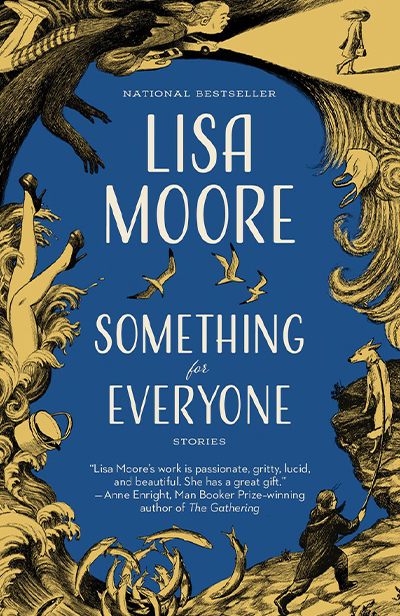
Something for Everyone by Lisa Moore
Steve rubs small circles on the inside of his own knee.
Right there, he says. He doesn’t break eye contact. The customer has large grey eyes and a habit of hyper-rapid blinking that suggests permanent incredulity. But her weak, caving chin gives Steve hope.
The customer reaches down to touch the inside of her knee, unconsciously mirroring him. Rubbing little circles. She blinks.
I guess so, she says. Then she says: Yes.
Steve nods. Slow, small nods, like a translator with an invisible earbud, hearing foreign things of life-altering importance and simultaneously transforming them into colloquial, sales-savvy koans about bones and joints and mortality.
His nodding affects a reluctant intimacy, as if many a customer could not get this kind of attention out of Steve, the kind she’s getting right now, nobody could, under normal circumstances, but look, lady, you are golden, I can see right inside you, the things you want, you are some kind of charismatic junior high school teacher and the eyes on you, and I get it, you want to run and it hurts. You are hurting.
She is nodding right back. Yes, she says. I feel it. When you’re running, Steve says. A pain, right here, this muscle?
Now he’s stroking the inside of his thigh.
Yes, that’s absolutely where it hurts, she says. He doesn’t break eye contact because that’s how good he is at selling shoes, but he intuits that behind him another customer he’s also agreed to help is on tiptoes, stretching for a buttery suede hiking boot with fringes, reaching for it, reaching. And he feels the eyes of his manager, Cathy, riveted on him.
You’re right, Aiden, yes, the junior high school teacher says to Steve, and she blinks. His nametag says Aiden. She’s caressing her own thigh.
See this right here, he asks. He’s holding the foot measurer.
The new heat-sensing Brannock foot measurer came with the spring shipment and Steve was the first to embrace the technology.
The old metal foot measurer has sliding parts that cup the ball of the foot and the top of the toes. The measurements are in the grooves that run down the side, like on the foot measurers of yore. The new Brannock introduces the first innovation to the original design since 1928, when the device was first invented; the metal has been fitted with a magic, footprint-shaped inlay.
Can I get you to take off your boot? Steve asks. He is careful with tone. He speaks atonally. Okay, yes. He has a husky timbre, a tamped-down friskiness this side of overtly sexual that is spontaneous, comes over him unbidden with the promise of a naked foot.
I’m not wearing any socks, she says. Does she blush? Steve drops to one knee in front of her, a signature move the other two salespersons, including Cathy, the manager, occasionally adopt, following his lead.
—
Excerpted from SOMETHING FOR EVERYONE. Copyright © 2018 by Lisa Moore. Excerpted by permission of Astoria, an imprint of House of Anansi Press. All rights reserved. No part of this excerpt may be reproduced or reprinted without permission in writing from the publisher.

Split Tooth by Tanya Tagaq
Sometimes we would hide in the closet when the drunks came home from the bar. Knee to knee, we would sit, hiding, hoping nobody would discover us. Every time it was different. Sometimes there was only thumping, screaming, moans, laughter. Sometimes the old woman would come in and smother us with her suffering love. Her love so strong and heavy it seemed a burden. Even then I knew that love could be a curse. Her love for us made her cry. The past became a river that was released by her eyes. The poison of alcohol on her breath would fill the room. She would wail and grab at us, kissing us, kissing the only things she could trust.
Fake-wood panel walls, the smell of smoke and fish. Velvet art hung on the walls, usually of Elvis or Jesus, but also polar bears and Eskimos.
The drunks came home rowdier than usual one night, so we opted for the closet. We giggle nervously as the yelling begins. Become silent when the thumping starts. The whole house shakes. Women are screaming, but that sound is overtaken by the sound of things breaking. Wet sounds of flesh breaking and dry sounds of wood snapping, or is that bone?
Silence.
There are loud pounding footsteps. Fuck! Someone is coming towards us. We stop breathing. Our eyes large in the darkness, we huddle and shiver and hope for the best. There is someone standing right outside the closet door, panting.
The door slides open, and my uncle sticks his head in. Towering over us, swaying and slurring. Blood pouring down his face from some wound above his hairline.
“I just wanted to tell you kids not to be scared.”
Then he closed the door.
—
Excerpted from SPLIT TOOTH. Copyright © 2018 by Tanya Tagaq. Excerpted by permission of Viking, an imprint of Penguin Canada, a division of Penguin Random House Canada Limited, a Penguin Random House Company. All rights reserved. No part of this excerpt may be reproduced or reprinted without permission in writing from the publisher.
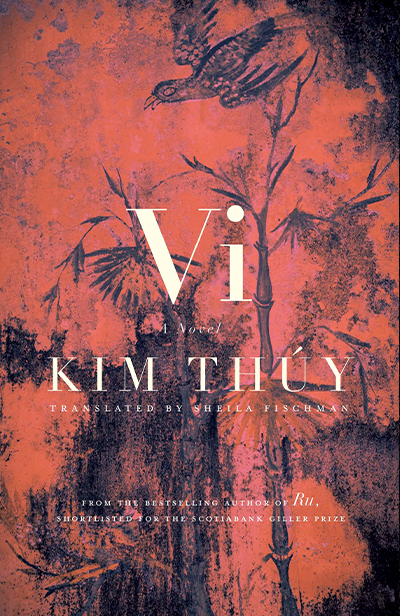
Vi by Kim Thúy, translated by Sheila Fischman
Under the fan fixed to the ivory wall of the dining room, a large bright-red sheet of rigid cardboard held a block of three hundred and sixty-five sheets of paper. On each was marked the month, the day of the week, and two dates: one according to the solar calendar, the other according to the lunar calendar. As soon as I was able to climb onto a chair, the task of tearing off a page was reserved for me when I woke up. I was the guardian of time. That privilege was taken away from me when my older brothers, Long and Loc turned seventeen. Beginning on the birthday, which we didn’t celebrate, my mother cried every morning in front of the calendar. It seemed to me that she was being torn apart each time she ripped off that day’s page. The tick-tock of the clock that usually put us to sleep at afternoon nap time suddenly sounded like a bomb waiting to explode.
I was the baby of the family, the only sister of my three big brothers, the one everyone protected like precious bottles of perfume behind glassed-in doors. Even though my young age meant I was somewhat sheltered from my family’s concerns, I knew that the two older boys would have to leave for the battlefield on the day they turned eighteen. Whether they were sent to Cambodia to fight Pol Pot or to the frontier with China, both destinations reserved for them the same fate, the same death.
—
Excerpted from VI. Copyright © 2016 Éditions Libre Expression. English translation copyright © 2018 Sheila Fischman. Excerpted by permission of Random House Canada, a division of Penguin Random Canada Limited. All rights reserved. No part of this excerpt may be reproduced or reprinted without permission in writing from the publisher.
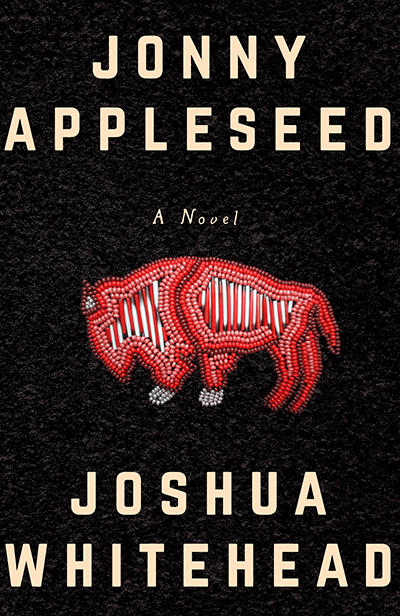
Jonny Appleseed by Joshua Whitehead
When I got a little older, I think I was fifteen, I remember watching Dan Savage and Terry Miller on the internet telling me that it gets better. They told me that they knew what I was going through, that they knew me. How so, I thought? You don’t know me. You know lattes and condominiums—you don’t know what it’s like being a brown gay boy on the rez. Hell, I’d never even seen a Starbucks and I sure as hell couldn’t tell you why a small coffee is called “tall.” That’s also around the time when I began to collect clients like matryoshka dolls, so I suppose at least my income got better. This was of course before the photo-sharing apps and cam sites that I use now to conduct my business, but at that time, the internet was packed with people wanting to connect with other people, especially there in Peguis. We had Facebook and cellphones to keep us in the loop. I used to sext with others in chatrooms on a gaming website, Pogo. I went by the name Lucia and pretended to be a girl to flirt with other boys. Often we’d play virtual pool or checkers and just dabble in small talk. Then I’d start putting ideas of sex into their heads by playing naïve and directing the conversation toward dirty subjects. I always liked to let them think they were the ones in control. I’m a sadist like that, I guess. I may be the sexual fantasy but I’m also the one in the driver’s seat. Once the image of sweaty, naked bodies got in their heads, there was no going back. Sex does strange things to people—it’s like blacking out or going on cruise control. Your body knows what it wants and goes for it. This can be dangerous, as I’d learn later, but if you can manipulate the urge, you can control a person. I felt like Professor Xavier—like I was telepathic.
That was how my webcam career began, with virtual pool and cybersex. That was how I met Tias. He was my first cyber boyfriend—I was the Russian princess Lucia and he was the five-years-older-thanhe- really-is Native boy who dreamed of losing his virginity.
We were quite the couple.
—
Excerpted from JONNY APPLESEED. Copyright © 2018 by Joshua Whitehead. Excerpted by permission of Arsenal Pulp Press. All rights reserved. No part of this excerpt may be reproduced or reprinted without permission in writing from the publisher.
Of the 2018 longlist, the jury writes:
We the jury devoted many, many delightful and arduous months of our lives coming up with this longlist. Our sole criteria going into this process was literary excellence. We were looking for books that were written in elevated, idiosyncratic, original prose that exhibited an exquisite command of the art of language, and unparalleled mastery of structure and storytelling. We argued viciously over books, expounding on their merits. But when the battle was over, what remained left us in awe. This list reflects the landscape of the current Canadian imagination: diverse, bold, edgy, exciting, reflective, aware, angry and joyous. Leave it to our literature to speak out beautifully from the far-flung edges of this huge mysterious land, and sing about the erased, the immigrants, the oppressed, the survivors, the entitled. It also reflects the myriad genres that Canadian writers are working in: auto-fiction, science-fiction, epic family sagas, historical novels, coming of age dramas, short-stories, satire. These are stories about and beyond Canada, a list so exciting, exhibiting such pure excellence, it stands up to any list in the world, and it is great, great fun to read.
2018 Jury
The Scotiabank Giller Prize is pleased to announce the award-winning, five-member jury panel for the 2018 prize.

Kamal Al-Solaylee
Kamal Al-Solaylee
Photo by Gary Gould

Maxine Bailey
Maxine Bailey
Photo by Pimentel

John Freeman
John Freeman

Philip Hensher
Philip Hensher

Heather O’Neill
Heather O’Neill
Heather O’Neill is a novelist, short story writer, poet and essayist. Her work, which includes Lullabies for Little Criminals, The Girl Who Was Saturday Night, Daydreams of Angels and The Lonely Hearts Hotel, has been shortlisted for the Governor General’s Award for Fiction, The Orange Prize for Fiction and the Scotiabank Giller Prize in two consecutive years, and has won CBC Canada Reads, The Paragraphe MacLennan Prize for Fiction and the Danuta Gleed Award. Born and raised in Montreal, O’Neill lives there today.
Photo by Julie Artacho
